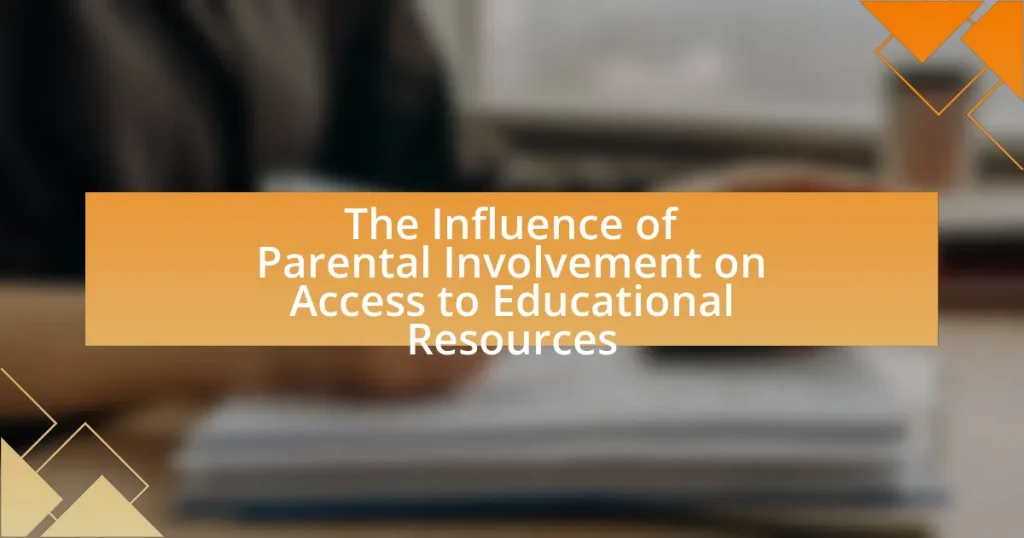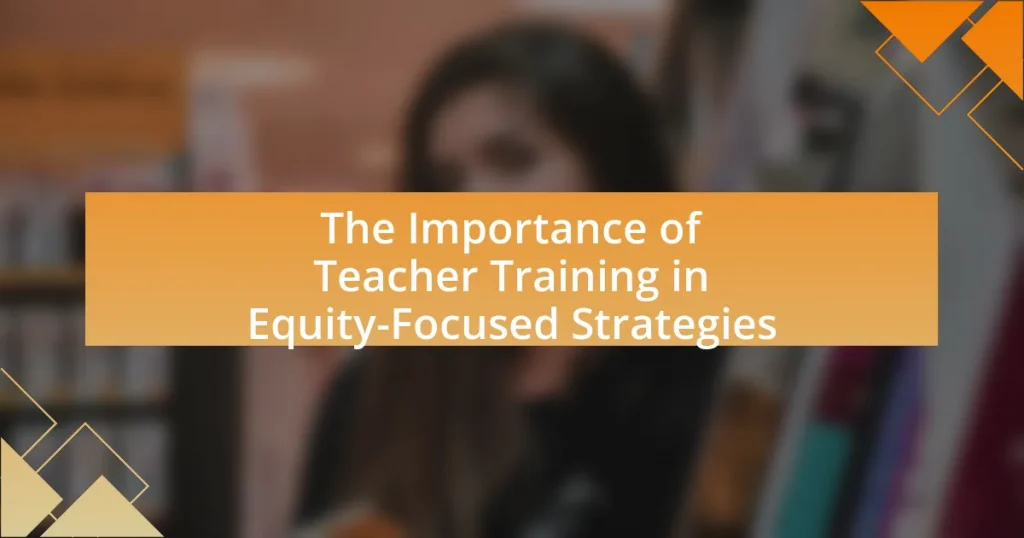Parental involvement plays a crucial role in enhancing children’s access to educational resources, significantly impacting their academic outcomes. Research indicates that engaged parents facilitate better access to materials such as books, technology, and extracurricular activities, leading to improved academic performance. The article explores how parental involvement varies across educational stages, the specific roles parents play, and the factors influencing their engagement, including socioeconomic status and cultural beliefs. Additionally, it addresses the challenges parents face in becoming involved and offers strategies for overcoming these barriers to improve access to educational resources for their children.
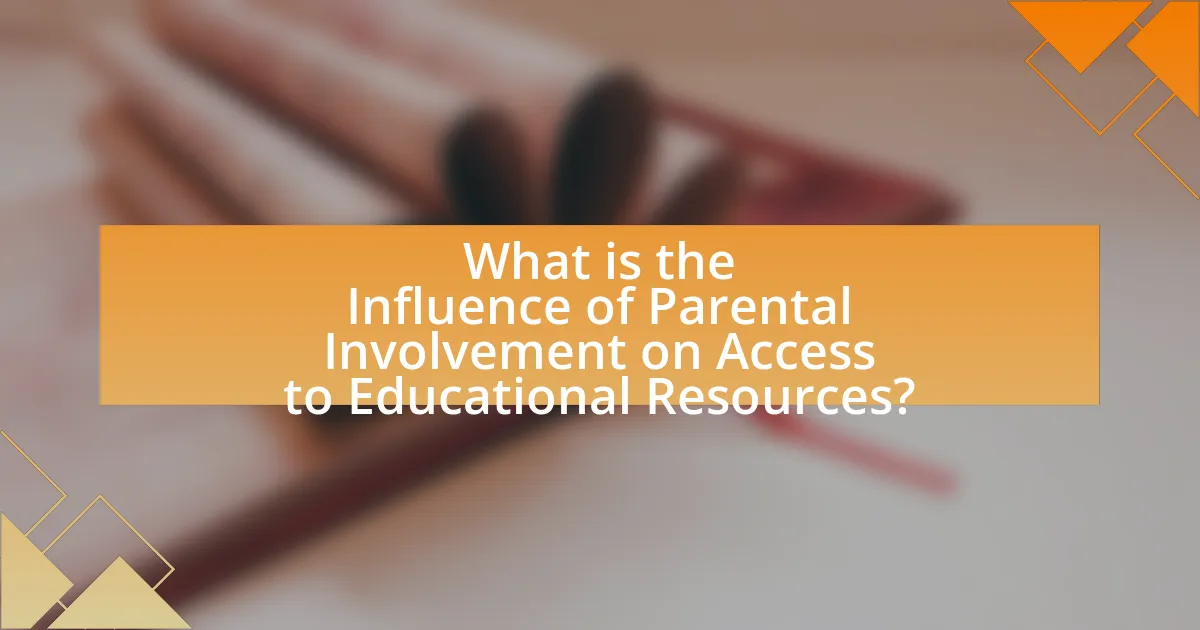
What is the Influence of Parental Involvement on Access to Educational Resources?
Parental involvement significantly enhances access to educational resources for children. Research indicates that when parents actively engage in their child’s education, it leads to increased availability of resources such as books, technology, and extracurricular activities. For instance, a study published in the “Journal of Educational Psychology” by Fan and Chen (2001) found that students with involved parents had better access to educational materials and support, which positively correlated with academic achievement. This involvement not only facilitates resource access but also fosters a supportive learning environment, further contributing to educational success.
How does parental involvement impact children’s educational outcomes?
Parental involvement significantly enhances children’s educational outcomes by fostering better academic performance, higher motivation, and improved behavior. Research indicates that children whose parents actively engage in their education tend to achieve higher grades and test scores. For instance, a study published in the “Journal of Educational Psychology” by Fan and Chen (2001) found that parental involvement positively correlates with students’ academic achievement across various age groups. This involvement includes activities such as helping with homework, attending school events, and communicating with teachers, which collectively create a supportive learning environment that encourages children to excel academically.
What specific roles do parents play in their children’s education?
Parents play a crucial role in their children’s education by acting as primary educators, supporters, and advocates. They facilitate learning by creating a conducive home environment, engaging in educational activities, and reinforcing school learning through discussions and assistance with homework. Research indicates that children whose parents are actively involved in their education tend to achieve higher academic success, as evidenced by a study published in the “Review of Educational Research,” which found that parental involvement positively correlates with student performance across various age groups. Additionally, parents advocate for their children’s needs within the educational system, ensuring access to resources and opportunities that enhance learning experiences.
How does parental engagement vary across different educational stages?
Parental engagement varies significantly across different educational stages, with higher involvement typically observed in early childhood and a decline noted during adolescence. Research indicates that parents are more actively engaged in their children’s education during preschool and elementary years, often participating in school activities, helping with homework, and communicating regularly with teachers. For instance, a study by Hill and Tyson (2009) found that parental involvement in elementary education positively correlates with children’s academic success. However, as children transition to middle and high school, parental engagement tends to decrease, influenced by factors such as increased independence of adolescents and changing family dynamics. This shift can impact access to educational resources, as less parental involvement may lead to reduced support for academic achievement during critical developmental stages.
Why is access to educational resources important for students?
Access to educational resources is crucial for students because it directly impacts their academic performance and overall development. Educational resources, such as textbooks, technology, and tutoring, provide essential support that enhances learning opportunities. Research indicates that students with access to quality educational materials score higher on standardized tests and demonstrate improved critical thinking skills. For instance, a study by the National Center for Education Statistics found that students with access to adequate educational resources are more likely to graduate high school and pursue higher education. This correlation underscores the importance of educational resources in fostering student success and achievement.
What types of educational resources are most beneficial for students?
The most beneficial types of educational resources for students include interactive digital tools, textbooks, and supplementary online materials. Interactive digital tools, such as educational software and apps, enhance engagement and facilitate personalized learning experiences. Textbooks provide foundational knowledge and structured content, while supplementary online materials, including videos and articles, offer diverse perspectives and additional context. Research indicates that students who utilize a combination of these resources tend to achieve higher academic performance, as evidenced by a study published in the Journal of Educational Psychology, which found that students using varied resources scored significantly higher on assessments compared to those relying solely on traditional textbooks.
How does resource access correlate with academic success?
Resource access significantly correlates with academic success, as students with greater access to educational resources tend to achieve higher academic performance. Studies indicate that access to resources such as textbooks, technology, and tutoring services enhances learning opportunities, leading to improved grades and test scores. For instance, research published in the “Journal of Educational Psychology” by Wang and Eccles (2013) found that students with access to a variety of learning materials and support systems demonstrated better academic outcomes compared to their peers with limited resources. This correlation underscores the importance of resource availability in fostering an environment conducive to academic achievement.
What factors influence the level of parental involvement in education?
The level of parental involvement in education is influenced by factors such as socioeconomic status, parental education level, cultural beliefs, and the availability of resources. Socioeconomic status affects parents’ ability to engage due to time constraints and financial limitations; for instance, parents with higher incomes often have more flexibility to participate in school activities. Parental education level correlates with involvement, as more educated parents typically value education and understand its importance, leading to greater engagement. Cultural beliefs also play a role, as some cultures prioritize education differently, impacting how parents interact with schools. Additionally, the availability of resources, such as transportation and communication tools, can facilitate or hinder parental participation in educational settings.
How do socioeconomic status and education level affect parental engagement?
Socioeconomic status and education level significantly influence parental engagement in children’s education. Higher socioeconomic status often correlates with increased access to resources, such as educational materials and extracurricular activities, which facilitates greater parental involvement. For instance, parents with higher education levels tend to understand the educational system better and are more likely to participate in school events and advocate for their children’s needs. Research indicates that parents with a college degree are more engaged in their children’s schooling compared to those with lower educational attainment, as they possess the knowledge and skills to navigate educational challenges effectively. Additionally, studies show that families from higher socioeconomic backgrounds are more likely to engage in activities that promote academic success, such as reading at home and attending parent-teacher conferences, thereby enhancing their children’s educational outcomes.
What cultural factors play a role in parental involvement?
Cultural factors significantly influence parental involvement in education. These factors include beliefs about education, communication styles, and family structure, which vary across different cultures. For instance, in collectivist cultures, parents may prioritize group harmony and community involvement, leading to higher engagement in school activities. Conversely, individualistic cultures may emphasize personal achievement, affecting the nature of parental support. Research indicates that cultural values shape expectations and practices regarding education, as seen in studies showing that Hispanic families often engage in educational activities that reflect their cultural heritage, thereby enhancing their children’s academic success.
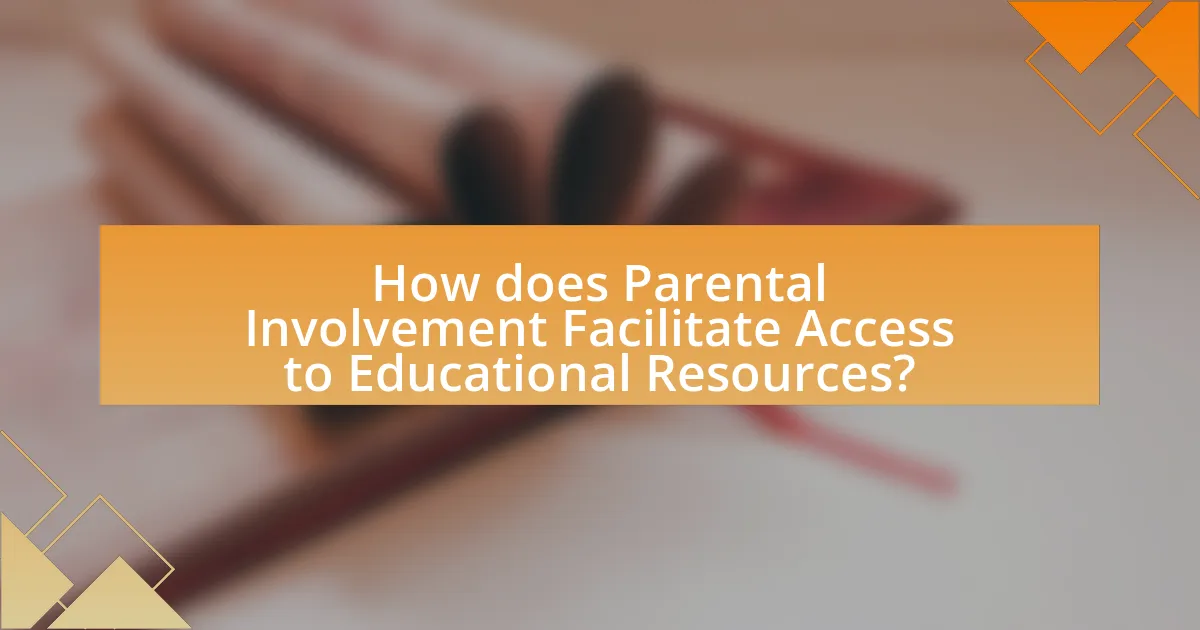
How does Parental Involvement Facilitate Access to Educational Resources?
Parental involvement facilitates access to educational resources by actively engaging in their children’s learning processes and advocating for their educational needs. When parents participate in school activities, they create stronger connections with educators, which can lead to increased awareness of available resources such as tutoring programs, extracurricular activities, and educational materials. Research indicates that students with involved parents are more likely to utilize school resources effectively, as these parents often communicate with teachers and school staff to understand and access the support their children require. For instance, a study published in the “Journal of Educational Psychology” found that parental engagement significantly correlates with students’ academic success and resource utilization, highlighting the critical role parents play in bridging the gap between students and educational opportunities.
What strategies can parents use to enhance their children’s access to resources?
Parents can enhance their children’s access to resources by actively engaging in their education and fostering a supportive learning environment. This includes establishing routines for homework and study, which has been shown to improve academic performance and resource utilization. Additionally, parents can seek out community resources such as libraries, tutoring programs, and extracurricular activities that provide educational support. Research indicates that children whose parents are involved in their education are more likely to take advantage of available resources, leading to better educational outcomes. For instance, a study by the National Center for Family & Community Connections with Schools found that parental involvement significantly correlates with increased student achievement and resource access.
How can parents advocate for better educational resources in schools?
Parents can advocate for better educational resources in schools by actively participating in school boards and committees. Engaging in these platforms allows parents to voice their concerns and needs regarding educational resources directly to decision-makers. Research indicates that schools with higher parental involvement often receive increased funding and resources, as demonstrated by a study from the Harvard Family Research Project, which found that schools with strong parental engagement are more likely to secure grants and community support. By collaborating with other parents, forming advocacy groups, and communicating with local legislators, parents can effectively influence policy changes that enhance educational resources in their schools.
What community resources can parents leverage for educational support?
Parents can leverage local libraries for educational support, as they offer free access to books, online resources, and educational programs. Many libraries provide tutoring services, workshops, and summer reading programs designed to enhance children’s learning. Additionally, community centers often host after-school programs and enrichment activities that support academic growth. Schools may also collaborate with local organizations to provide resources such as mentoring programs and access to technology. These community resources are essential in fostering a supportive educational environment for children, as evidenced by studies showing that access to such resources correlates with improved academic performance.
How does communication between parents and educators affect resource access?
Communication between parents and educators significantly enhances resource access for students. When parents actively engage in dialogue with educators, they can better understand available resources, such as tutoring programs, special education services, and extracurricular activities. Research indicates that effective communication leads to increased parental awareness of educational opportunities, which in turn facilitates greater utilization of these resources. For instance, a study by the Harvard Family Research Project found that schools with strong parent-teacher communication reported higher levels of resource access and student participation in programs. This demonstrates that open lines of communication directly correlate with improved access to educational resources for students.
What are effective ways for parents to communicate with teachers?
Effective ways for parents to communicate with teachers include regular email correspondence, attending parent-teacher conferences, and utilizing school communication platforms. Regular email correspondence allows parents to ask questions and receive updates about their child’s progress, fostering a continuous dialogue. Attending parent-teacher conferences provides an opportunity for face-to-face interaction, enabling parents to discuss specific concerns and collaborate on strategies for their child’s success. Utilizing school communication platforms, such as online portals or apps, ensures that parents stay informed about assignments, events, and important announcements, enhancing their engagement in the educational process. Research indicates that effective communication between parents and teachers positively impacts student achievement, as highlighted in the study “Parental Involvement and Student Academic Performance: A Multiple Mediational Analysis” published in the Journal of Educational Psychology.
How can schools support parental involvement in resource access?
Schools can support parental involvement in resource access by providing clear communication channels and resources tailored to parents’ needs. For instance, schools can organize workshops that educate parents about available educational resources, such as tutoring programs and online learning platforms. Research indicates that when schools actively engage parents through informational sessions, parental participation increases, leading to improved student outcomes (Henderson & Mapp, 2002). Additionally, schools can create online portals where parents can easily access information about resources, schedules, and support services, thereby enhancing their ability to assist their children effectively.
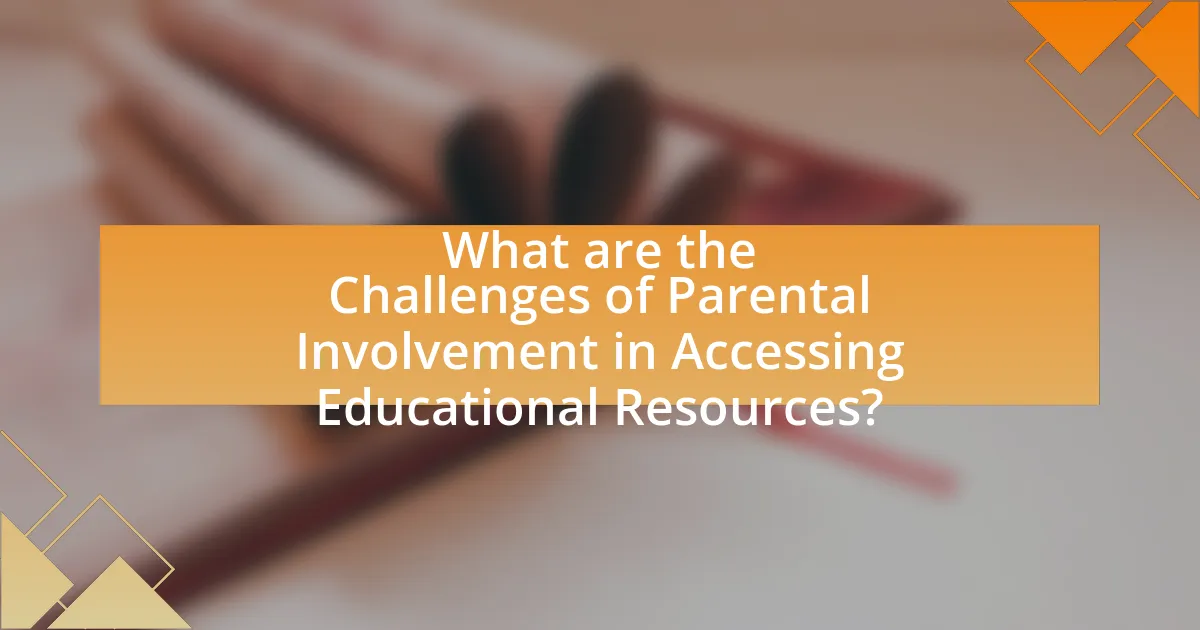
What are the Challenges of Parental Involvement in Accessing Educational Resources?
The challenges of parental involvement in accessing educational resources include limited time, lack of knowledge about available resources, and socioeconomic barriers. Parents often struggle to find time to engage with educational materials due to work and family commitments, which can hinder their ability to support their children’s learning. Additionally, many parents may not be aware of the educational resources available, such as online platforms or community programs, which limits their involvement. Socioeconomic factors also play a significant role; families with lower income may lack access to technology or transportation needed to utilize educational resources effectively. These challenges collectively impact the level of parental involvement in their children’s education, as evidenced by studies indicating that increased parental engagement correlates with better educational outcomes for students.
What barriers do parents face in becoming involved in their children’s education?
Parents face several barriers in becoming involved in their children’s education, including time constraints, lack of understanding of the educational system, and socioeconomic challenges. Time constraints arise from work commitments and other responsibilities, limiting parents’ availability to engage with schools. A lack of understanding of the educational system can lead to feelings of intimidation or confusion about how to participate effectively. Socioeconomic challenges, such as financial instability or limited access to transportation, further hinder parents’ ability to attend school events or meetings. Research indicates that these barriers significantly impact parental involvement, which is crucial for enhancing children’s educational outcomes.
How do time constraints impact parental engagement?
Time constraints significantly reduce parental engagement by limiting the time available for parents to participate in their children’s educational activities. Research indicates that when parents face tight schedules due to work or other commitments, their ability to attend school events, help with homework, or communicate with teachers diminishes. For instance, a study published in the Journal of Educational Psychology found that parents with less than 10 hours a week available for involvement reported lower levels of engagement, which negatively affected their children’s academic performance. This correlation highlights the critical role that time availability plays in fostering effective parental involvement in education.
What role does technology play in facilitating or hindering parental involvement?
Technology plays a dual role in facilitating and hindering parental involvement in education. On one hand, technology enhances communication between parents and schools through platforms like email, messaging apps, and online portals, allowing parents to stay informed about their child’s progress and school activities. For instance, a study by the National Center for Education Statistics found that 90% of parents reported using technology to communicate with teachers, which fosters greater engagement in their child’s education.
Conversely, technology can hinder parental involvement when access is limited or when parents lack digital literacy. Research from the Pew Research Center indicates that 15% of parents with lower socioeconomic status struggle with internet access, which can lead to disengagement from school-related activities and information. This digital divide creates barriers that prevent some parents from fully participating in their child’s educational journey.
How can parents overcome challenges to improve their involvement?
Parents can overcome challenges to improve their involvement by actively seeking resources and support systems that facilitate engagement in their children’s education. For instance, establishing communication with teachers and school staff can provide parents with insights into their child’s academic progress and needs. Research indicates that when parents participate in school activities, such as parent-teacher conferences, it leads to better educational outcomes for students (Henderson & Mapp, 2002). Additionally, utilizing community resources, such as educational workshops and parenting classes, can equip parents with strategies to support their children’s learning at home. By prioritizing time for educational activities and fostering a positive learning environment, parents can significantly enhance their involvement and, consequently, their children’s access to educational resources.
What resources are available to assist parents in becoming more involved?
Resources available to assist parents in becoming more involved include educational workshops, online platforms, and community organizations. Educational workshops often provide training on effective parenting strategies and ways to engage with schools, while online platforms like Parent-Teacher Association websites offer resources and forums for discussion. Community organizations, such as local non-profits, frequently host events and provide materials aimed at fostering parental engagement in education. These resources are supported by research indicating that increased parental involvement positively impacts student achievement and school performance.
How can schools create a more inclusive environment for parental involvement?
Schools can create a more inclusive environment for parental involvement by implementing diverse communication strategies that cater to various cultural and linguistic backgrounds. For instance, providing translation services and multilingual resources ensures that non-English speaking parents can engage effectively with school activities and policies. Research indicates that schools with strong parental engagement programs, such as those highlighted in the study “The Impact of Parental Involvement on Student Success” by the Harvard Family Research Project, see improved student outcomes and increased access to educational resources. Additionally, schools can host community events that celebrate cultural diversity, fostering a sense of belonging and encouraging participation from all families.
What best practices can enhance parental involvement for better access to educational resources?
Best practices that can enhance parental involvement for better access to educational resources include establishing regular communication between schools and families, providing workshops that educate parents on available resources, and creating volunteer opportunities that engage parents in school activities. Regular communication fosters a partnership between educators and parents, ensuring that families are informed about resources and events. Workshops can empower parents with knowledge about educational tools and support systems, increasing their ability to assist their children. Additionally, volunteer opportunities allow parents to become active participants in the educational environment, which has been shown to improve student outcomes and resource accessibility. Research indicates that schools with strong parental engagement see higher student achievement and better resource utilization, highlighting the importance of these practices.
